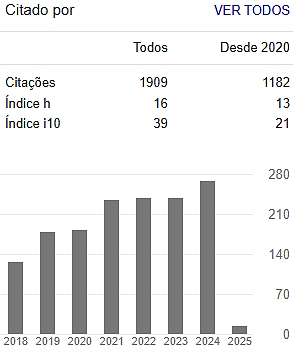THE DIGITAL TECHNOLOGIES OF INFORMATION AND COMMUNICATION:
A DOCUMENTAL ANALYSIS IN THE NATIONAL COMMON BASED HIGH EDUCATION CURRICULUM
Keywords:
Information and communication technology, High school, Media Education, Education ContentsAbstract
The aim of this article is to identify in the National Common Curriculum Base (BNCC) of High School how the Digital Technologies of Information and Communication (TDIC) are being mentioned and discuss whether these mentions are sufficient to contemplate critical media education for teaching Medium. The digital language is present in society and must be explored as a means of communication, information, interactivity and mainly as a means of conceiving new devices. Thus, it is expected that Basic Education offers subsidies to use and reflect on these technologies. As a methodology, the document analysis of the BNCC document was applied using the Adobe Acrobat Reader DC software, using the Word Search command “Ctrl + F”. The search resulted in only eleven mentions in the part destined to High School, and most of the mentions are located in the Area of Languages and Its Technologies. Based on the evidence provided by the literature, the importance of the document and the relevance of TIDC's in today's society, it is concluded that the chosen theme needs a qualitative and quantitative expansion in the BNCC. Technologies are important parts of contemporary reality and have their value increasingly proven, either scientifically or in daily use, but this study is limited to the documentary field, as no observational research was carried out.
Downloads
References
BONILLA, M. H. S.; PRETTO, N. de L. Política educativa e cultura digital: entre práticas escolares e práticas sociais. Perspectiva, Florianópolis, v. 33, n. 2, p.
-521, mai.-ago. 2015. Disponível em: https://periodicos.ufsc.br/index.php/perspectiva/article/view/2175795X.2015v33n2p499/31292. Acesso em: 29 nov 2020
BRASIL. Ministério da Educação. Base Nacional Comum Curricular: Ensino Médio. 2017. Disponível em: http://portal.mec.gov.br/index.php?option=com_docman&view=download&alias =85121-bncc-ensino-medio&category_slug=abril-2018-pdf&Itemid=30192. Acesso em: 08 dez. 2020.
BRASIL. Constituição (2014). Lei nº 13.005, de 25 de junho de 2014. Plano Nacional de Educação - Pne. Brasil, n. 13.005. Disponível em:
http://www.planalto.gov.br/ccivil_03/_Ato2011-2014/2014/Lei/L13005.htm.
Acesso em: 14 dez. 2020.
BRASIL. Constituição (1996). Lei nº 9.394, de 20 de dezembro de 1996. Lei de Diretrizes e Bases da Educação Nacional. Brasil, n. 9.394. Disponível em: http://www.planalto.gov.br/ccivil_03/Leis/L9394.htm. Acesso em: 14 dez. 2020.
CASTELLS, M. A sociedade em rede. 20. ed. São Paulo: Paz e Terra, 2019. p. 67-113.
EDUCAMÍDIA (Brasil). Educação Midiática. nn. Disponível em: https://educamidia.org.br/educacao-midiatica. Acesso em: 05 ago. 2021.
GONÇALVES, A. M.; DEITOS, R. A. Competências gerais da Base Nacional Comum Curricular (BNCC): fundamentos teóricos e ideológicos. Eccos - Revista Cientifica, São Paulo, n. 52, p. 1-19, e10678, jan./mar. 2020. Disponível em: https://doi.org/10.5585/eccos.n52.10678.
Lyytinen, A.; Hölttä, S. A resposta das politécnicas finlandesas aos desafios das políticas de inovação e de desenvolvimento regional. Caderno CRH [online]. 2011, v. 24, n. 63. pp. 467-480. Disponível em: <https://doi.org/10.1590/S0103-49792011000300002>. Epub 24 Fev 2012. ISSN 1983-8239. https://doi.org/10.1590/S0103-49792011000300002
MARSIGLIA, A. C. G.; PINA, L. D.; MACHADO, V. O.; LIMA, M. Germinal:
Marxismo e Educação em Debate, Salvador, v. 9, n. 1, abr. 2017. p. 107-121.
NEIRA, M.G. Incoerências e inconsistências da BNCC de Educação Física.
Revista Brasileira de Ciências do Esporte. Volume 40, Issue 3. July– September 2018, Pages 215-223
NOVA ESCOLA (Brasil). Nova Escola: quem somos. 2021. Disponível em: https://novaescola.org.br/quem-somos. Acesso em: 26 jul. 2021.
SÁ-SILVA, J.R.; de ALMIEDA, C.D.; GUINDANI, J.F.; Pesquisa documental: pistas teóricas e metodológicas. Revista Brasileira de História & Ciências Sociais Ano I - Número I - Julho de 2009.
Da Silva, T. T. Documentos de identidade: uma introdução às teorias do currículo. Belo Horizonte, MG: Autentica, 1999.
SPINELLI, E. M.; SANTOS. J. de A. Alfabetização midiática na era da desinformação, ECCOM, v. 11, n. 21, jan./jun. 2020. p. 147-164. Disponível em: http://unifatea.com.br/seer3/index.php/ECCOM/article/vie:w/1034/1060. Acesso em: 27 dez. 2020.
STEPHANIE KIM ABE (Brasil). Cenpec. Educação midiática: como trabalhar o olhar crítico e a cidadania na sala de aula. 2020. Disponível em: https://www.cenpec.org.br/noticias/educacao-midiatica-como-trabalhar-o-olhar-critico-e-a-cidadania-na-sala-de-aula. Acesso em: 26 jul.2021
POUPART, J. et al. A pesquisa qualitativa Enfoques Epistemológicos e Metodológicos. 4o ed. Petrópolis, RJ: Vozes, 2014.
PRETTO, N de L.; ASSIS, A. Cultura digital e educação: redes já! In: PRETTO, N; SILVEIRA, S. A. (Org). Além das redes de colaboração: internet, diversidade cultural e tecnologias do poder. Salvador, Edufba, 2008. p. 75-83. Disponível em: https://static.scielo.org/scielobooks/22qtc/pdf/pretto-9788523208899.pdf. Acesso em: 28 dez. 2020.

